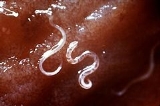
Parasitic worm
Overview
Parasitic worms or helminths (icon) are a division of eukaryotic
parasites
that, unlike external parasites such as lice and flea
s, live inside their host. They are worm-like organism
s that live and feed off living hosts
, receiving nourishment and protection while disrupting their hosts' nutrient
absorption, causing weakness and disease
. Those that live inside the digestive tract are called intestinal parasite
s. They can live inside humans as well as other animals.
Helminthology
is the study of parasitic worms and their effect on their host
s.
Eukaryote
A eukaryote is an organism whose cells contain complex structures enclosed within membranes. Eukaryotes may more formally be referred to as the taxon Eukarya or Eukaryota. The defining membrane-bound structure that sets eukaryotic cells apart from prokaryotic cells is the nucleus, or nuclear...
parasites
Parasitism
Parasitism is a type of symbiotic relationship between organisms of different species where one organism, the parasite, benefits at the expense of the other, the host. Traditionally parasite referred to organisms with lifestages that needed more than one host . These are now called macroparasites...
that, unlike external parasites such as lice and flea
Flea
Flea is the common name for insects of the order Siphonaptera which are wingless insects with mouthparts adapted for piercing skin and sucking blood...
s, live inside their host. They are worm-like organism
Organism
In biology, an organism is any contiguous living system . In at least some form, all organisms are capable of response to stimuli, reproduction, growth and development, and maintenance of homoeostasis as a stable whole.An organism may either be unicellular or, as in the case of humans, comprise...
s that live and feed off living hosts
Host (biology)
In biology, a host is an organism that harbors a parasite, or a mutual or commensal symbiont, typically providing nourishment and shelter. In botany, a host plant is one that supplies food resources and substrate for certain insects or other fauna...
, receiving nourishment and protection while disrupting their hosts' nutrient
Nutrient
A nutrient is a chemical that an organism needs to live and grow or a substance used in an organism's metabolism which must be taken in from its environment. They are used to build and repair tissues, regulate body processes and are converted to and used as energy...
absorption, causing weakness and disease
Disease
A disease is an abnormal condition affecting the body of an organism. It is often construed to be a medical condition associated with specific symptoms and signs. It may be caused by external factors, such as infectious disease, or it may be caused by internal dysfunctions, such as autoimmune...
. Those that live inside the digestive tract are called intestinal parasite
Intestinal parasite
Intestinal parasites are parasites that populate the gastro-intestinal tract in humans and other animals. They can live throughout the body, but most prefer the intestinal wall. Means of exposure include: ingestion of undercooked meat, drinking infected water, and skin absorption...
s. They can live inside humans as well as other animals.
Helminthology
Helminthology
Helminthology is the study of worms, especially parasitic worms. This field deals with the study of their taxonomy and the effect on their hosts....
is the study of parasitic worms and their effect on their host
Host (biology)
In biology, a host is an organism that harbors a parasite, or a mutual or commensal symbiont, typically providing nourishment and shelter. In botany, a host plant is one that supplies food resources and substrate for certain insects or other fauna...
s.

